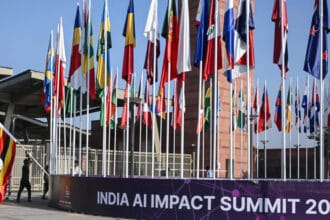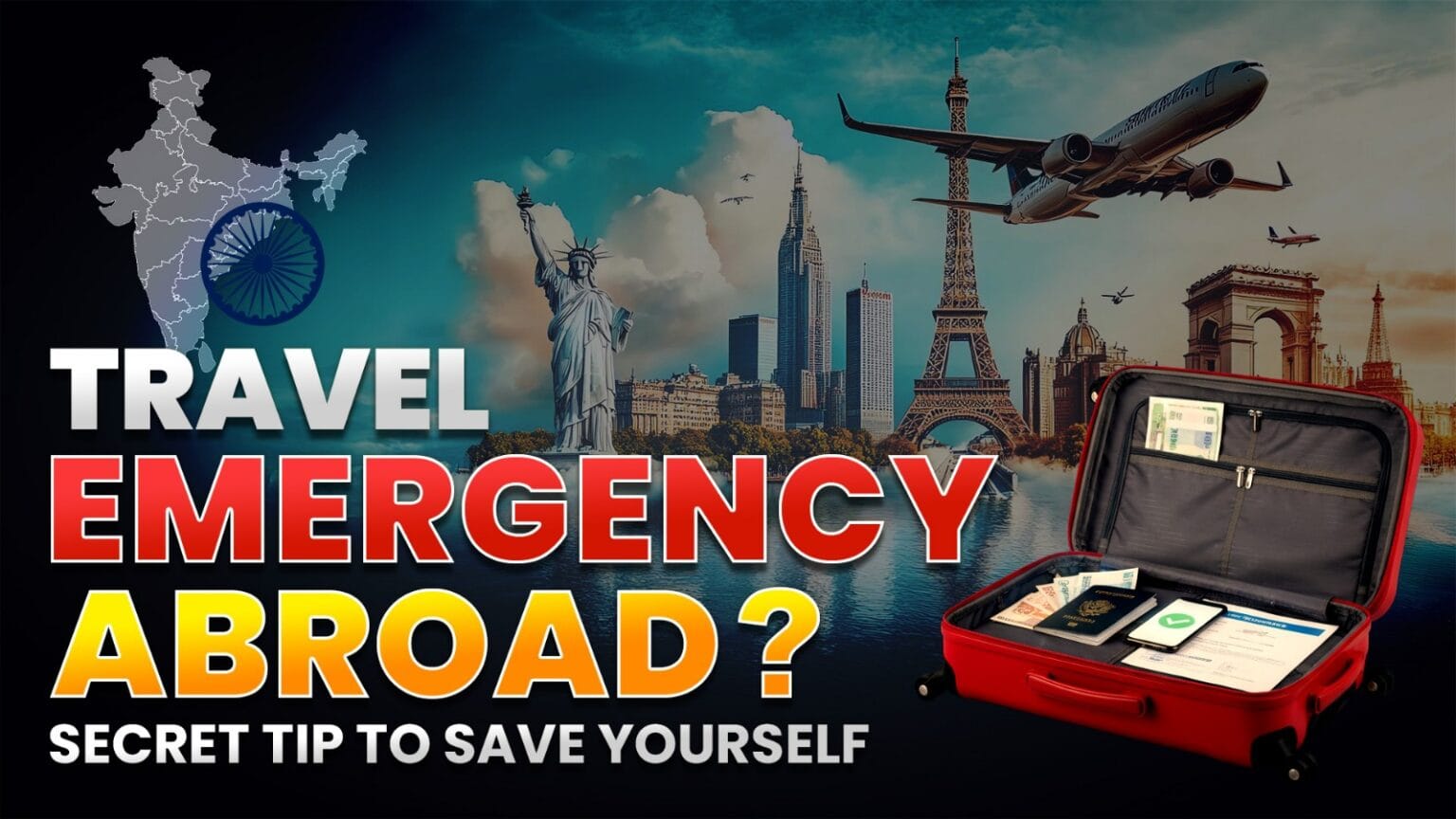Introduction
Traveling abroad is exciting — new places, new people, new experiences. But it also comes with risks. What if your money runs out, your passport gets lost, you fall ill, or you get into legal trouble? In such distressing situations, many Indians assume they’re left stranded. But that’s not entirely true.
India’s government has established a safeguard called the Indian Community Welfare Fund (ICWF), which is designed to help Indian citizens in crisis while abroad. In this blog, we’ll dive deep into what ICWF is, how it works, what kinds of help it offers, who is eligible, how to apply, and real stories to illustrate its impact.
By the end, you’ll know exactly what you need to do (and carry) if you ever face trouble overseas.
1. What exactly is ICWF?
ICWF stands for Indian Community Welfare Fund. It is a fund managed by India’s Ministry of External Affairs (MEA) and operated through Indian Embassies and Consulates worldwide to provide emergency assistance to Indian citizens facing distress overseas. Press Information Bureau+3MEA, Government of India+3Diaspora for Development+3
Here are key features and principles:
- The fund is used only for Indian citizens (i.e. holders of Indian passports) — Persons of Indian Origin (PIOs) or Overseas Citizens of India (OCI card holders) are not eligible for individual financial assistance under ICWF. MEA, Government of India+2eoiantananarivo.gov.in+2
- The assistance is means-tested and provided only in deserving cases — i.e. when the person genuinely cannot arrange the funds on their own. eoi.gov.in+3MEA, Government of India+3cgimunich.gov.in+3
- The fund is self-sustaining. That means, instead of being fully financed from government budget, ICWF is partly funded through service charges levied on consular, passport, visa services provided by Indian Missions abroad. Diaspora for Development+3MEA, Government of India+3Press Information Bureau+3
- ICWF was instituted around 2009 to ensure there is a formal mechanism to assist overseas Indians in emergencies. Diaspora for Development+2Press Information Bureau+2
- Decision-making authority for disbursement is delegated to diplomatic missions (Embassies / Consulates) under guidelines issued by MEA. Embassy of India Astana+3Diaspora for Development+3cgimunich.gov.in+3
In short: When you are an Indian citizen abroad and face a serious emergency you cannot solve on your own, ICWF exists to step in as a lifeline.
WATCH THE VIDEO HERE:
2. What services and kinds of help does ICWF provide?
The ICWF covers a broad range of services, in what the MEA and Embassies call “contingent expenditure” in distressed situations. Below is a detailed list of what it can cover (subject to eligibility, mission discretion, and the “means-tested, deserving case” criteria). eoi.gov.in+5Press Information Bureau+5Embassy of India Astana+5
| Service / Assistance | Description / Scope |
|---|---|
| Boarding & lodging (shelter) | If you are stranded without money, Embassy may arrange short-term accommodation, food, etc. Especially helps unskilled workers/domestic workers in distress. Press Information Bureau+7Embassy of India+7Embassy of India Astana+7 |
| Emergency medical care | If you fall seriously ill or need hospitalization and can’t pay, the Embassy may arrange or pay for initial medical assistance. cgimunich.gov.in+5Embassy of India+5Embassy of India Astana+5 |
| Air passage / repatriation to India | If you are stranded and cannot afford a ticket back, ICWF may cover one-way travel costs to India. cgimunich.gov.in+5MEA, Government of India+5eoi.gov.in+5 |
| Initial legal assistance | In certain deserving cases, the Embassy may offer initial legal support (consultation or arranging a lawyer) for detained Indians or legal troubles. Press Information Bureau+4MEA, Government of India+4eoi.gov.in+4 |
| Payment of small fines / penalties | If an Indian is imprisoned/detained and needs payment of a small fine or penalty for release, ICWF can be tapped. Press Information Bureau+2Embassy of India Astana+2 |
| Repatriation of mortal remains / cremation | If an Indian citizen passes away abroad and there is no sponsor or family capacity, ICWF can help airlift the mortal remains to India or arrange local burial/cremation. cgimunich.gov.in+5Press Information Bureau+5micicinitiative.iom.int+5 |
| Other incidental / emergency costs | There could be miscellaneous expenses like local transportation, temporary expenses, etc. in line with norms. micicinitiative.iom.int+1 |
Examples / Use Cases
- A domestic worker in a foreign country who is abandoned by an employer and left without shelter or money.
- An Indian traveller whose passport is lost or stolen and can’t get a new one immediately.
- A migrant worker with a broken contract, no money, and wants to return home but can’t afford a flight.
- A person detained for visa overstay or a minor offence and unable to pay fine.
- A person who passes away abroad and family cannot afford repatriation of remains.
Also read – Donald Trump’s New H1B Visa Rules & Lottery System Explained
3. Repatriation (Return Ticket) — What You Should Know
One of the most important and well-known uses of ICWF is for arranging repatriation or return flights to India when someone is stranded without resources. The MEA has a page specifically on Repatriation to India in distressed situations. MEA, Government of India
Key points:
- The cost of return passage to India should normally be borne by the foreign employer / sponsor if applicable under contract. But if that fails (e.g. contract breakdown), you may be eligible for repatriation under ICWF. MEA, Government of India
- The Embassy / Consulate can arrange a one-way ticket to India, subject to mission rules and means test. MEA, Government of India
- Your employer or sponsor might also be required to cooperate with exit formalities (exit visa, etc.), but if they refuse, Indian mission may intervene in limited cases. MEA, Government of India+2eoi.gov.in+2
- If your passport has been lost or stolen, you can ask the Embassy for an Emergency Certificate (EC) — a single-use travel document to return to India when a new passport can’t be issued in time. CGI SF
So repatriation is not automatic for everyone — it depends on circumstances, mission discretion, and proof of inability to pay.
4. Legal Assistance & Consular Support
Another critical pillar under ICWF is legal aid and consular support for Indians in distress abroad. This is often less known but essential in complicated cases. Press Information Bureau+4MEA, Government of India+4eoi.gov.in+4
What kind of legal/consular help can be extended?
- Advice or guidance on local laws, rights, court proceedings.
- Arranging a local lawyer in deserving cases (especially for Indians in prison/detention). No fee is typically charged for legal support under ICWF in such cases. eoi.gov.in+3Digital Sansad+3MEA, Government of India+3
- Help in putting in contact with local authorities, translation, monitoring of cases.
- In cases of disputes with employer or sponsor, the mission may intervene or liaise with local authorities. Indian Embassy UAE+1
Limits / caveats
- It’s limited to initial legal assistance — missions may not fully wage complex litigation forever.
- The decision is on a case-by-case basis, based on whether it’s a deserving case.
- The person must cooperate, provide documents, and prove inability to secure lawyer or bear costs.
5. Eligibility Criteria, Conditions & Limitations
Knowing what qualifies you (and what doesn’t) is critical. Below are detailed eligibility rules and limitations:
Who can benefit
- Indian citizens holding Indian passports. OCIs, PIOs, or persons of Indian origin are not eligible for individual financial assistance under ICWF. MEA, Government of India+2eoiantananarivo.gov.in+2
- Must have entered the foreign country legally (i.e., no illegal entry). eoiantananarivo.gov.in+1
- Must be in a distress / emergency / crisis situation where the person cannot arrange funds themselves.
- The mission (Embassy / Consulate) must be satisfied that the applicant is genuinely in need and deserving.
- Usually, they consider only discretionary / emergency assistance, not regular or long-term support.
What disqualifies / limitations
- OCIs, PIOs: no direct ICWF benefits.
- Persons illegally residing in a country may have difficulties claiming.
- The assistance is temporary and emergency in nature, not long-term subsidies.
- Missions may deny requests considered non-genuine, non-urgent, or avoidable.
- There may be caps / ceilings on how much can be spent under ICWF by any mission, guided by MEA rules. (Though specific published ceilings are less often publicized.) Embassy of India Astana+1
- You will likely need to repay certain assistance (especially repatriation costs) once you are back or able. (In many cases, assistance is considered a loan, not a grant.) Note: While some sources talk about “support” or “assistance,” many embassy operations treat it as contingent help that must be reimbursed. You should ask mission in your case.
6. Application / How to Seek ICWF Assistance (Step-by-Step)
Here’s a detailed walkthrough of what you must do if you find yourself in trouble abroad and need to access ICWF help:
Step 0: Before You Travel — Preparation (Highly Recommended)
- Save the contact details of the Indian Embassy / Consulate in your destination country (phone, email, website).
- Also keep local emergency numbers (police, ambulance) of the city you’ll stay in.
- Share your itinerary and embassy contacts with a family member back home.
- Carry digital + physical copies of your passport, visa, tickets, emergency contact, embassy contact.
- Register electronically (if the Indian mission offers a system) so that embassy knows Indian nationals present there.
Step 1: Contact The Indian Mission Immediately
When trouble strikes, call or email the Indian Embassy / Consulate of that country. Explain your situation clearly (medical emergency, stranded, lost passport, etc.). Use “urgent / emergency” in subject line.
Step 2: Fill Out Request / Application Form
The mission will provide a request form (written or digital) in which you must furnish:
- Identity details (passport number, name, address)
- Travel documents, visa copies
- Details of the emergency / distress situation (medical reports, police complaint, bills, etc.)
- Proof of inability to meet expenses
- Any other supporting documentation the mission requests
You may be asked for local contacts, reports, witness statements, etc.
Step 3: Verification & Assessment
The mission staff will examine your case. They will decide whether:
- Your situation qualifies as “distress”
- You genuinely cannot pay or arrange help
- You are “deserving” under the ICWF guidelines
Based on that, the mission may approve or reject your assistance.
Step 4: Disbursement & Assistance
If approved, you may receive:
- Funds to cover lodging / shelter / food, or direct arrangement by embassy
- A hospital admission or medical costs
- A repatriation ticket (one-way)
- Legal assistance
- Payment of small fines
- Repatriation of remains, if needed
The mission may pay directly to service providers or reimburse you.
Step 5: Post-assistance Settlement / Repayment
- In many cases, the assistance given (especially travel costs) may be considered contingent advance / loan, which you or someone on your behalf may have to reimburse to government later (once your financial situation stabilizes).
- You may need to submit further proofs / settlement documentation.
- The embassy may also get in touch after you are back in India for closure of case.
7. Real-Life Examples & Relevance Today
Example: Operation Ganga (Ukraine Evacuation)
During the Russia–Ukraine conflict in 2022, the Indian government conducted Operation Ganga, evacuating ~25,000 Indian nationals from Ukraine and neighbouring countries. Wikipedia While not solely ICWF, this large-scale evacuation underlines how India steps in to rescue citizens abroad in conflict zones.
Example: Gulf / Middle East Labour / Domestic Worker Cases
In countries like UAE, many Indian domestic workers or laborers have found themselves abandoned, unpaid, or in legal trouble. Embassies have used ICWF to provide short-term shelter, arrange exit formalities, help with legal notices, or reimburse travel to India when employer fails. Press Information Bureau+3Indian Embassy UAE+3Embassy of India Astana+3
Example: Repatriation of Mortal Remains
There have been numerous cases where Indian nationals died abroad and their families couldn’t afford repatriation. Missions have used ICWF to transport remains or arrange local burial/cremation. eoi.gov.in+3Press Information Bureau+3cgidubai.gov.in+3
These real use-cases show that ICWF is not just theoretical — in many emergencies, people have been saved, brought home, or given legal support because of this fund.
8. Why This Matters Especially Now
- More global instability: Wars, conflicts, civil unrest, pandemics — more people are vulnerable abroad.
- Climate disasters & crises: Natural calamities can disrupt travel, trap tourists, or displace communities.
- Migrant workers’ vulnerabilities: Many workers go abroad under risky conditions; exploitation, contract breaks, abandonment, non-payment are common risks.
- Awareness gap: Many Indians abroad don’t even know this safety net exists.
Thus, being informed about ICWF is not optional — it’s essential for anyone venturing overseas.
9. Tips to Maximize Your Chances & Precautions
- Always document everything (medical bills, bills, reports, photos).
- Be honest and transparent — misleading or false claims may lead to rejection.
- Follow up with missions regularly; keep communication records.
- Ask upfront: is the assistance loan or grant? Will I need to repay it?
- Don’t rely solely on ICWF — also explore local insurance, embassy of your country, travel insurance, contacting friends/family.
- Beware of fraudsters: some people misrepresent themselves or pose as embassy officials asking for money. Example: There was a scam alert in Dubai where fake agencies falsely claimed to help repatriation under ICWF. Gulf News
- Keep embassy contact numbers saved offline (i.e. not just in apps) and share with someone you trust.
- Register with embassy mission’s Indian citizen registration (if available) when you arrive abroad; missions often maintain a database of Indians present in that country.
- Travel insurance is still your first line of defense; ICWF is fallback for extreme emergencies.
10. Frequently Asked Questions (FAQs)
Q1. Is ICWF only for Indians stranded in trouble, or also for routine support?
A: Only for emergencies / distress / contingencies. It is not meant for regular or non-urgent support.
Q2. Do I get assistance automatically?
A: No — you must apply, prove your need, and missions assess each case individually.
Q3. Do I have to repay the assistance?
A: In many cases, especially for repatriation, the assistance is treated as an advance or loan and may be recoverable when you are stable. Always clarify with the embassy.
Q4. If I’m an OCI / PIO, can I use ICWF?
A: No, ICWF support is generally restricted to Indian citizens only. OCI/PIO are excluded for individual financial assistance. Diaspora for Development+3MEA, Government of India+3eoiantananarivo.gov.in+3
Q5. What happens if I lose my passport while abroad?
A: You can apply for an Emergency Certificate (EC) from the Indian Mission — a one-time travel document allowing you to return to India. CGI SF
Q6. Can ICWF pay for full hospital bills abroad?
A: It may cover initial emergency medical care, but not full long-term treatment. The mission decides based on your condition, cost, and eligibility.
11. Suggested SEO Titles, Subheadings & Meta Description
Suggested SEO Titles:
- “Indian Community Welfare Fund (ICWF): Emergency Help for Indians Abroad”
- “How Indian Govt Rescues Indians Overseas: ICWF Explained”
- “Stuck Abroad? Indian Mission Can Help via ICWF – Here’s How”
Meta Description (for SEO / SERP):
“Got stranded abroad? The Indian Community Welfare Fund (ICWF) provides emergency help — medical aid, repatriation ticket, legal support, shelter — for Indian citizens facing distress overseas. Learn eligibility, procedure, real stories & travel tips in this complete guide.”
Use subheadings (H2 / H3) like “What is ICWF?”, “Services Covered by ICWF”, “Repatriation & Emergency Certificate”, “Eligibility & Limitations”, “How to Apply Step by Step”, “Real Life Use Cases”, “Tips & Precautions”, “FAQs” to organize content and help SEO.
12. Step-by-Step Sample Scenario (Illustrative)
Let’s walk through a hypothetical example to bring all the above into context:
Scenario
Riya, an Indian student, travels to Country X for an exchange program. During her stay, her wallet is stolen, passport is missing, and she doesn’t have enough money to pay rent or buy food. She calls her family, but they are not able to transfer money immediately. She is stranded, lonely, and frightened.
What Riya should do (following our guide):
- Contact Indian Embassy / Consulate of Country X immediately, giving them phone + email + location.
- Embassy gives her a request / assistance form, which she fills with details: passport number, travel plan, missing passport report, local police report, proof of being a student, bank statements showing no funds, etc.
- The mission examines her case, sees she is in genuine distress and unable to pay. They approve shelter + food + lodging under ICWF.
- Meanwhile they help her file for an Emergency Certificate (EC) so that she can travel back to India when ready.
- When funds are arranged (e.g. via family), she may repay cost of lodging or travel.
- After she returns, she completes necessary paperwork to close the case.
This scenario is a combination of assistance types — lodging, EC, repatriation — all under the ICWF umbrella.
13. Limitations, Challenges & Suggestions for Improvement
While ICWF is a crucial safety net, it is not perfect. Here are challenges and suggestions:
Limitations / Challenges
- Awareness is low: Many Indians abroad have never heard of ICWF, so they don’t even try.
- Discretion & mission variability: Each Embassy / Consulate has discretion, so outcomes can vary widely country to country.
- Funding constraints / caps: Missions have limited budgets and ceilings. They may deny large requests.
- Repayment ambiguity: Lack of clarity sometimes whether assistance is grant or loan.
- Delays: Bureaucracy can delay timely response, which is dangerous in emergencies.
- Fraud / misuse risk: fake agents might exploit people, claiming to arrange ICWF help for a fee (as seen in the Dubai scam alert). Gulf News
Suggestions / Improvements
- Better awareness campaigns in Indian diaspora communities, universities, travel forums.
- Transparent ceiling / eligibility guidelines made public mission-wise, so requesters know norms.
- A fast-track emergency protocol with minimal documentation for critical cases.
- Digital application / tracking via a portal, so people can apply and monitor status.
- Regular audits and oversight to reduce misuse & fraud.
14. Conclusion & Final Takeaways
The Indian Community Welfare Fund (ICWF) is a powerful but underappreciated tool in India’s foreign welfare arsenal. It is the government’s way to say: “If one of ours is truly in distress abroad, we will step in.”
Key takeaways for you (reader / viewer):
- Know that ICWF exists, and it’s not just hearsay — it has been used to rescue thousands.
- Before traveling abroad, gather embassy contact info; register where available; store it offline.
- In crisis, act fast: contact embassy, describe situation, submit documents.
- Understand that assistance is discretionary, means-tested, and may require repayment.
- Use ICWF as a backup — your first defense should also include proper planning, insurance, awareness, and local support.
If you face a severe crisis abroad, you are not alone — India has mechanisms to help. But the help works best when you are aware, proactive, and prepared.






